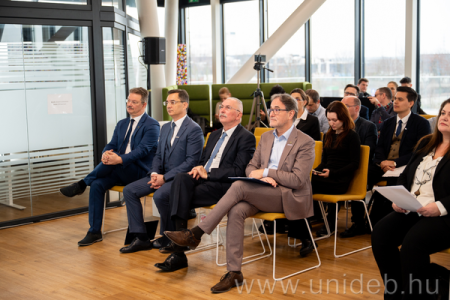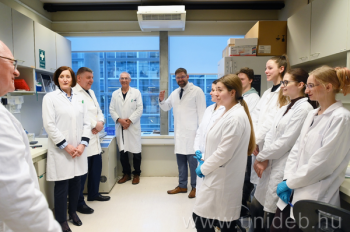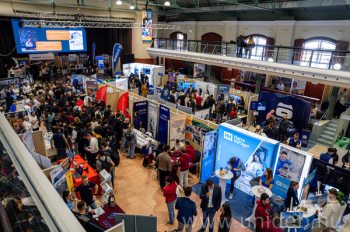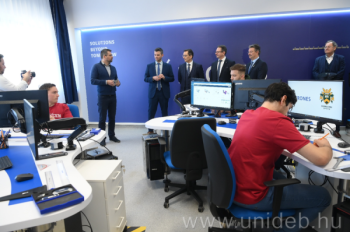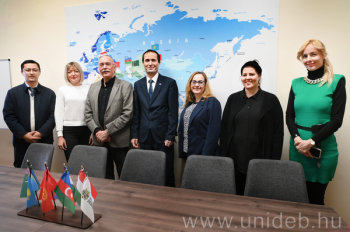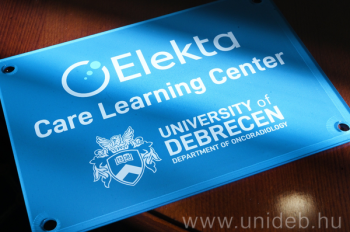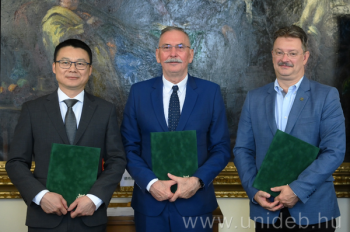As a consequence of the automotive investments in Debrecen, our city has become a new center of the automotive industry in Central Europe, which exerts significant influence on the life of Debrecen. In order to study the overall impact, a research group called DEB AUT has been established at the University of Debrecen, which examines how this kind of development affects employment, training needs, university structure, urban transport, cultural life and social mobility.
Hírek Industrial cooperation címkével
Employees of the BMW company in Debrecen have joined the training program for students of automotive engineering at DE MK, the Faculty of Technology of the University of Debrecen. At the training center of the Bavarian automobile manufacturer's new Debrecen plant, the students could acquire the most recent technological knowledge in the subject called Vehicle Manufacturing II.
TAPI Hungary Industries Kft. has recently supported the Faculty of Science and Technology of the University of Debrecen with two million HUF. The company’s contribution has been used to purchase laboratory equipment.
Three new laboratories with world-class equipment were inaugurated on Monday at the Faculty of Engineering of the University of Debrecen. Almost 600 million forints from state, university and corporate sources were spent on the modern equipment of the facilities established in the recently inaugurated wing of the Ótemető Street Campus building.
Representatives of partner companies could learn in detail about wide-ranging corporate network and development strategy of the University of Debrecen, the training system and new investments at the Faculty of Engineering, as well as the industrial development plans and achievements of our city at the conference named Az Ipar Napja Debrecenben [Industry Day in Debrecen]. There were some thirty companies represented at the exhibition of the related trade fair in the building of Lovarda [the former Equestrian Center].
How can a woman become a successful leader? Is there a career and/or motherhood dilemma? What are the drawbacks of young people communicating today mostly in the digital space? These were some of the issues discussed recently at MÜZLI Pódium, while at another event of Debreceni Egyetem Mérnöki és Üzletfejlesztési Innovációs Intézet [Institute for Engineering and Business Development Innovation at the University of Debrecen], the Alumni Party, students could ask questions freely addressed at the master teachers in our Learning Center.
Our students majoring in mechanical engineering at the University of Debrecen can now acquire the most up-to-date knowledge in the new Krones Hungary Géptervező Laboratórium [Krones Hungary Machine Design Laboratory], which has been established as a result of the cooperation between the Faculty of Engineering and the company Krones Hungary Kft. This unit, which is equipped with state-of-the-art computers, software and measuring instruments, was inaugurated on Tuesday in the Faculty's Ótemető utca building in the presence of managers both from the university and the company.
The production of several new herbal preparations is in the pipeline due to the cooperation between the Faculty of Pharmacy of the University of Debrecen and the Tashkent Institute of Pharmacy, which has been developed in recent years. There are also plans to jointly research and develop bacteriophage-based pharmaceuticals.
The Oncoradiological Clinic of the University of Debrecen has been awarded the title Elekta Qualified Regional Training Centre. This means that, from next year, the clinic will offer theoretical and practical training programs for oncoradiology specialists from Central and Eastern Europe. The relevant cooperation agreement was signed by the representatives of our institution and those of the company Elekta on Wednesday at the University of Debrecen.
The University of Debrecen and CATL's Hungarian subsidiary have signed a strategic partnership agreement. This cooperation covers several fields and disciplines, including IT, engineering, natural sciences, research and development, education, as well as science and industry. The ensuing cooperation will enable our university to move forward in the development of engineering programs that satisfy corporate needs, while CATL Debrecen will definitely benefit from this milestone through strengthening the supply of professional experts in Hungary.
